Starting your baby on solid foods is a thrilling milestone in their development.
While there are plenty of store-bought options, many parents opt for homemade baby food recipes to ensure their little ones get fresh, nutrient-rich meals. Making baby food at home is not only cost-effective but also allows you to control the ingredients, ensuring your child receives only the best.
In this guide, we’ll walk you through easy homemade baby food recipes that are simple, nutritious, and perfect for your growing baby. From purees to finger foods, these recipes are designed to give your baby a healthy start in life.
Why Homemade Baby Food?
Many parents wonder why they should make baby food at home when there are convenient options available in stores. Here are a few reasons why homemade baby food is an excellent choice for your child:
- Control Over Ingredients: By preparing meals at home, you can ensure that only fresh, whole ingredients are used, without any preservatives, artificial flavors, or added sugar.
- Cost-Effective: Store-bought baby food can be expensive. Making your food at home allows you to save money, especially when using seasonal and locally sourced ingredients.
- Introduction to New Flavors: Homemade meals expose your baby to a wider range of flavors, which can help develop their palate and reduce picky eating habits in the future.
Now, let’s dive into some easy and delicious homemade baby food recipes!
1. Simple Carrot Puree
Carrots are an excellent first food for babies. They’re rich in vitamins A and C, which are essential for healthy growth and development.
Ingredients:
- 2 large carrots
- Water for boiling
Instructions:
- Peel and chop the carrots into small pieces.
- Put the chopped carrots in a pot and add enough water to cover them.
- Bring to a boil, then reduce the heat to keep it at a gentle simmer. Cook until the carrots are soft (about 10–12 minutes).
- Drain the water and blend the carrots in a food processor or with a handheld blender until smooth. Add a small amount of water, breast milk, or formula to reach your desired consistency.
- Allow the puree to cool before serving.
Tip: You can freeze this puree in small portions for later use. Simply thaw and warm up when ready to serve.
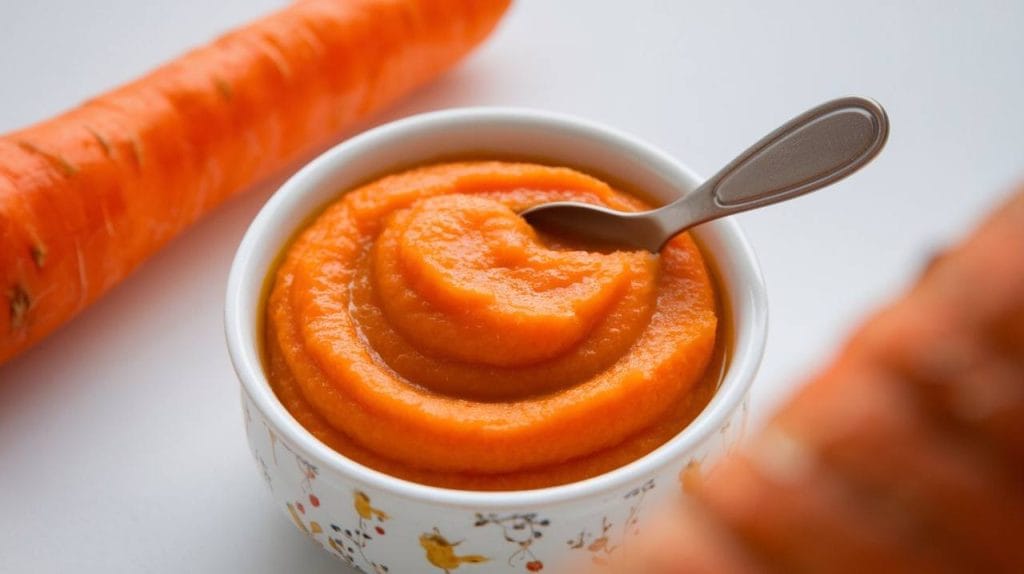
2. Apple and Sweet Potato Mash
This recipe is a delightful combination of sweet flavors and packed with fiber, vitamins, and minerals. Sweet potatoes are a great source of beta-carotene, while apples add natural sweetness.
Ingredients:
- 1 medium sweet potato
- 1 apple
Instructions:
- Peel and dice the sweet potato and apple into small cubes.
- Steam both ingredients until tender (about 15 minutes).
- Transfer the cooked sweet potato and apple to a blender and puree until smooth. Add water or breast milk if needed to adjust the texture.
- Let the mixture cool down before feeding your baby.
This mash is a great way to introduce your baby to naturally sweet flavors while providing essential nutrients.
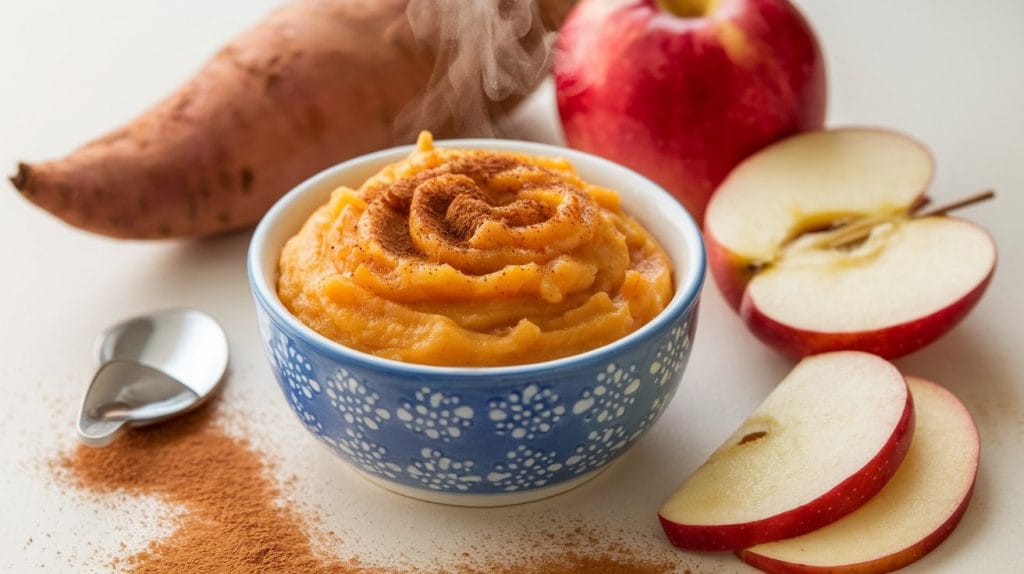
3. Avocado and Banana Mash
Rich in healthy fats and potassium, this avocado and banana mash is creamy and perfect for babies ready to try new textures.
Ingredients:
- 1 ripe avocado
- 1 ripe banana
Instructions:
- Scoop the avocado flesh into a bowl.
- Peel the banana and mash both the avocado and banana together using a fork or blender until smooth.
- Serve immediately. No cooking is required for this easy and nutritious recipe!
This recipe can be a quick snack or a light meal for your little one, and the combination of fats and vitamins makes it a powerhouse for growth.
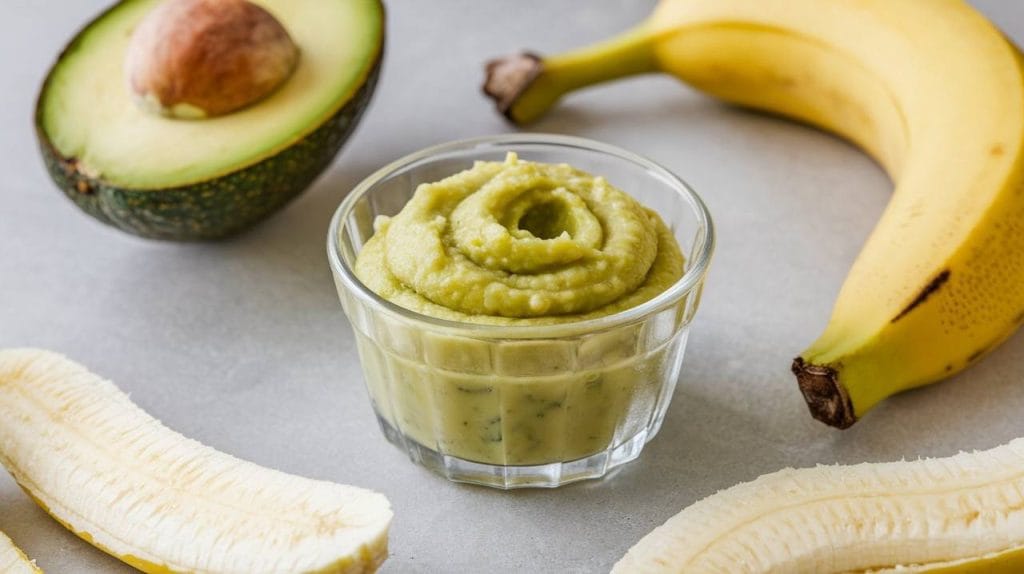
4. Oatmeal and Blueberry Porridge
Once your baby is ready for grains and solid foods, this oatmeal porridge with blueberries is an excellent option. Oats provide fiber and energy, while blueberries add antioxidants.
Ingredients:
- ¼ cup of oats
- ½ cup of water or milk (breast milk or formula)
- ¼ cup of fresh or frozen blueberries
Instructions:
- Prepare the oats following the instructions on the package, using either water or milk.
- When the oats have softened, gently fold in the blueberries. If you’re working with frozen berries, ensure they are fully thawed and heated before use.
- Blend or mash the mixture to achieve the desired consistency.
- Let it cool fully before serving it to your little one.
This porridge can be served as breakfast or a snack and is perfect for babies transitioning to more complex flavors.
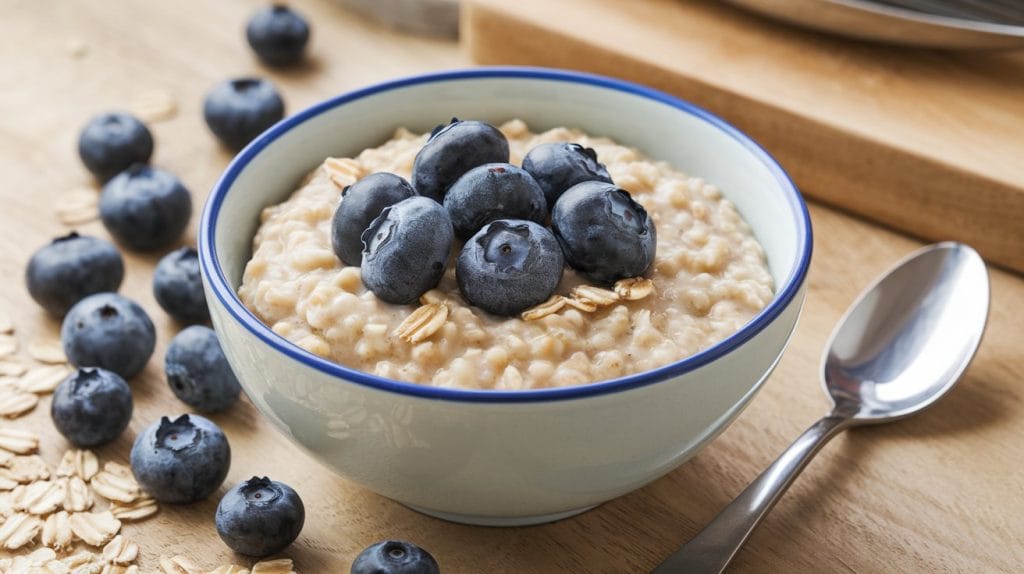
5. Green Pea and Spinach Puree
Rich in vitamins A, C, K, and iron, this green pea and spinach puree provides a nutrient-dense option for babies just starting on solid foods.
Ingredients:
- 1 cup of frozen green peas
- 1 handful of fresh spinach leaves
Instructions:
- Steam the green peas until they become tender, which should take around 5 to 7 minutes.
- Add the spinach during the last minute of steaming to wilt it.
- Transfer to a blender and puree until smooth. Add water or breast milk to thin if necessary.
- Serve warm after cooling slightly.
This vibrant green puree is an excellent way to introduce your baby to leafy greens from an early age.
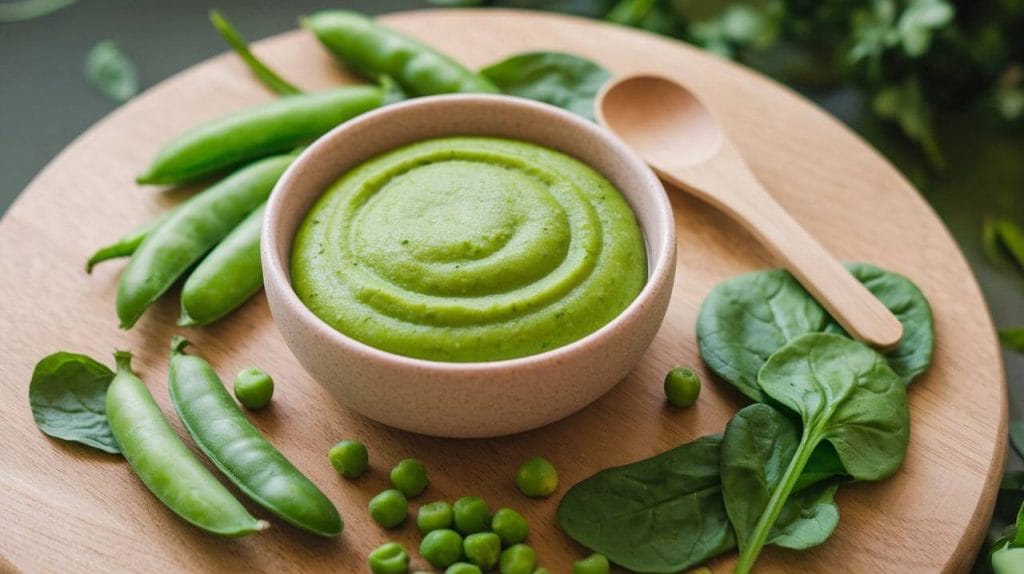
Tips for Preparing Homemade Baby Food
Here are some extra tips to assist you on your journey of making homemade baby food:
- Use Fresh Ingredients: Opt for fresh, organic fruits and vegetables whenever possible. This guarantees that your baby receives nutrient-rich meals that are free from harmful pesticides.
- Make mealtime easier by batch-cooking baby food and freezing it in small, single-serving portions for quick and convenient use.
For easy portioning, try using ice cube trays or silicone molds. - Begin with simplicity: Introduce one food at a time, particularly when starting solids. This helps identify any potential allergies or sensitivities.
- Consistency Matters: Start with smooth purees and gradually increase texture as your baby gets older. This helps them transition to more solid foods.
Conclusion: A Healthy Start with Homemade Baby Food
Making baby food at home can be a rewarding and nutritious way to ensure your little one is getting the best possible start in life. With these easy recipes and tips, you can create healthy, delicious meals for your baby while also saving money and controlling the ingredients they consume. Remember to introduce new foods gradually and consult with your pediatrician if you have any concerns about your baby’s nutrition.
